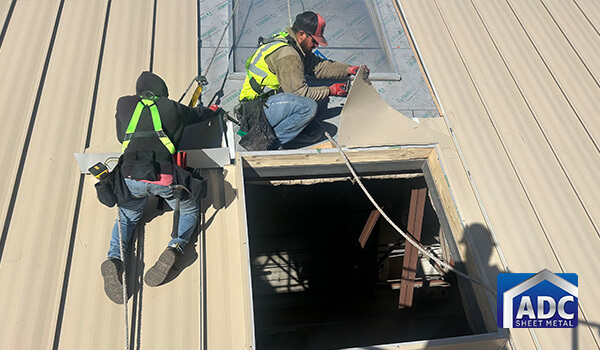In the world of construction and manufacturing, the role of a sheet metal contractor is pivotal. These professionals shape and join metal to create a variety of products and structures.
They provide essential metal fabrication services, crafting custom solutions for diverse industries.
One of the top benefits of metal shearing and forming in commercial construction is the precision and efficiency it brings to projects. Sheet metal contractors specialize in processes like cutting, bending, and assembling metal sheets into tailored components, ensuring each piece meets exact specifications and design requirements.
But what exactly does a sheet metal contractor do? This guide aims to answer that question.
We’ll delve into the responsibilities of these skilled tradespeople. We’ll explore the services they offer, the processes they follow, and the materials they use.
We’ll also discuss the importance of certifications, the impact of technology, and the role of sustainability in their work.
By the end of this guide, you’ll have a comprehensive understanding of what a sheet metal contractor does and why their work is so important.
Understanding the Role of a Sheet Metal Contractor
A sheet metal contractor specializes in the fabrication and installation of metal products. Their work involves taking raw metal and turning it into precise components. These components are then used in construction, manufacturing, and other sectors.
This includes cutting, bending, and assembling metal sheets into a finalized product. They ensure each piece is crafted to meet exact specifications and design requirements.
In construction, they play a crucial role by fabricating structural elements and decorative features. Their expertise is vital in developing both aesthetic and functional components in buildings.
Custom metal work is a significant aspect of their service offering. Projects often require tailored solutions to meet specific needs. Contractors deliver bespoke designs that fit unique spaces or fulfill particular functions.
Custom metal fabrication distinguishes a project, adding value through innovation. This personalized approach ensures that the final product is both practical and visually appealing. It’s a testament to the skill and creativity of these professionals.
To summarize, a sheet metal contractor is more than just a technician. They are craftsmen who transform metals into essential parts and structures. Their work supports various industries and elevates many projects with their custom touches. These experts bring to life the concepts envisioned by architects, engineers, and designers.
Services Offered by Sheet Metal Contractors
Sheet metal contractors offer a comprehensive suite of metal fabrication services. These services encompass designing, crafting, and installing a myriad of metal components. They address the needs of different industries with precision and skill.
Metal Fabrication Services Explained
Metal fabrication is the cornerstone of a contractor’s offerings. This process turns raw metal sheets into finished products. Contractors use advanced techniques to ensure accuracy and durability.
The services typically include:
- Cutting, bending, and assembling metal parts
- Custom metal design and creation
- Welding and finishing techniques
- Precision sheet metal fabrication
Each step in the fabrication process requires expertise and attention to detail. By leveraging technology and craftsmanship, these contractors guarantee high-quality results.
Architectural Metalwork and Design
Architectural metalwork is another vital service offered. Contractors work closely with architects to create both decorative and functional metal elements. These include railings, facades, and ornamental fixtures.
Design and aesthetics play a crucial role in this field. Each piece must complement the building’s overall design and meet structural requirements.
Industrial and Commercial Applications
Sheet metal contractors serve a variety of industrial sectors. They provide components for machinery, equipment, and manufacturing processes. Their work supports heavy industry with durable and reliable metal parts.
In commercial settings, contractors also offer solutions like commercial ductwork and signage. Their versatility allows them to meet diverse client needs across different applications.
Residential Metalwork Solutions
In the residential sector, custom metal work plays a significant role. Homeowners often seek unique, personalized features for their properties. Contractors provide custom solutions like staircases, gates, and roofing elements.
These customized pieces enhance the home’s aesthetic while offering functionality. Working closely with clients, contractors ensure each piece meets personal taste and specifications.
Sheet metal contractors offer a wealth of services. They cater to various sectors by providing tailored metal solutions. Their expertise ensures that each project, big or small, receives the attention and precision it deserves. Through innovation and craftsmanship, they bring metal projects to life, fulfilling the needs of clients from every industry.
The Sheet Metal Fabrication Process
The sheet metal fabrication process transforms flat metal sheets into functional objects. This involves several critical stages. Each stage requires specialized skills and techniques.
Overview of Cutting, Bending, and Assembling
Initially, the fabrication process involves cutting the metal sheets. Various tools like lasers and shears are used for precision cutting. Accurate cutting ensures the pieces fit together seamlessly.
Next, the bending stage shapes the cut metal pieces. Machinery, such as press brakes, bends sheets to specified angles. This step creates the dimensions necessary for the design.
Lastly, assembling brings the pieces together into a finished product. Techniques like welding and riveting are employed. This stage is essential to ensure structural integrity and functionality.
Types of Metals Used
Contractors work with a wide range of metals. Selection depends on the project’s needs and applications. Common materials include:
- Stainless Steel: Known for its strength and corrosion resistance.
- Aluminum: Valued for its lightweight nature and versatility.
- Copper: Used for its aesthetic appeal and conductive properties.
- Brass: Chosen for decorative applications due to its gold-like appearance.
Each type of metal has unique properties and suitability for different applications. Understanding these properties ensures optimal material selection for each task.
Precision and Quality Control in Fabrication
Precision is paramount in the fabrication process. Even minor errors can lead to significant issues. Contractors use advanced machinery and technology to uphold strict tolerances.
Quality control measures are integrated throughout the process. Regular inspections ensure every piece meets high standards. This attention to detail guarantees longevity and reliability in the final products.
Overall, the sheet metal fabrication process is intricate and requires exceptional expertise. From selecting the appropriate materials to assembling the final product, each step is critical to achieving the desired result. Through meticulous quality control and precision craftsmanship, contractors ensure that every project is delivered with excellence.
Project Management and Safety Standards
Effective project management is vital in metalwork. It ensures projects are completed on time and within budget. Moreover, it helps coordinate complex tasks and resource allocation.
Good project management involves meticulous planning and scheduling. It allows contractors to anticipate potential challenges. Thus, they can implement strategies to mitigate risks.
Adhering to safety standards is crucial in sheet metal work. The metal fabrication industry is fraught with hazards. These include sharp edges, heavy machinery, and high temperatures.
Contractors must follow stringent safety regulations to protect workers. This includes providing proper training and equipment. Regular safety audits help maintain a secure working environment.
Compliance with safety standards not only safeguards workers but also enhances productivity. It minimizes downtime due to accidents or errors. Ultimately, adherence to safety protocols instills confidence in clients and maintains a contractor’s reputation.
Choosing the Right Materials and Techniques
Selecting the proper metal material is crucial for any project. Different metals suit different purposes. Factors such as strength, weight, and resistance influence this choice.
Common materials used include aluminum, steel, and copper. Each has distinct properties. For example, aluminum is lightweight and corrosion-resistant, while steel is known for strength.
Metal finishing techniques enhance the durability and appearance of finished products. These techniques include powder coating and galvanizing. They protect metal surfaces from rust, wear, and environmental damage.
Besides protection, finishes can also provide aesthetic appeal. Custom metal work often requires specific finishes. This enhances the look and feel of the final product.
In summary, choosing suitable materials and techniques is essential. Consider application, environment, and aesthetics. Here’s a quick overview of factors to consider:
- Strength and durability needs
- Environmental exposure
- Cost considerations
- Desired aesthetic and finish
- Weight requirements
Understanding these elements ensures project success and meets client expectations.
The Importance of Certification and Training
Certifications are vital for sheet metal contractors. They validate skills and ensure adherence to industry standards. Examples include certifications from organizations like the American Welding Society and the Sheet Metal and Air Conditioning Contractors’ National Association.
Continuous education plays a key role in a contractor’s success. The industry evolves with new technologies and methods. Keeping up with these changes ensures that contractors remain competitive and effective in their work.
Training programs offer hands-on experience and theoretical knowledge. This dual approach helps contractors tackle complex projects with confidence. Up-to-date training ensures that contractors comply with the latest safety standards and regulations. Investing in ongoing education not only improves skills but also builds client trust. It’s a commitment to quality and excellence in every project.
Environmental Considerations and Sustainability
Sustainability is increasingly important in metal fabrication. Many sheet metal contractors adopt eco-friendly practices to reduce their environmental impact. This shift is driven by a growing demand for greener solutions in the industry.
Recycled and eco-friendly materials are at the forefront of these practices. Using recycled metals reduces waste and conserves natural resources. Contractors also focus on energy-efficient processes and waste reduction during production. These efforts contribute significantly to creating a more sustainable future in metal fabrication, aligning with modern environmental standards and expectations.
How to Choose the Right Sheet Metal Contractor
Selecting the right sheet metal contractor is crucial for your project. Consider their experience and expertise in relevant areas. Check if they have handled projects similar to yours in scale and scope.
Reputation is another vital factor. Look for contractors with positive reviews and testimonials. Ask for references or portfolios of previous work. A well-regarded contractor is likely to deliver quality services.
Evaluate their certifications and training. Reputable contractors should have proper credentials and ongoing education. This ensures they adhere to industry standards and stay updated with the latest techniques.
Hiring a professional contractor offers several advantages over DIY. Skilled contractors bring specialized knowledge and sophisticated tools. They can achieve higher precision and quality, saving you time and potential errors. Their expertise ensures that projects are completed efficiently and safely, providing lasting results.
The Future of Sheet Metal Contracting
The sheet metal industry is constantly evolving with technological advancements. Trends like automation, sustainable practices, and improved materials are shaping the future. Contractors adopting these trends can provide innovative and efficient solutions.
The role of sheet metal contractors is also expanding. They are becoming integral to more industries, from construction to energy. As the demand for custom and precise metal work grows, these professionals will continue to hold a pivotal position. Embracing change and focusing on quality will drive their success in the future marketplace.






